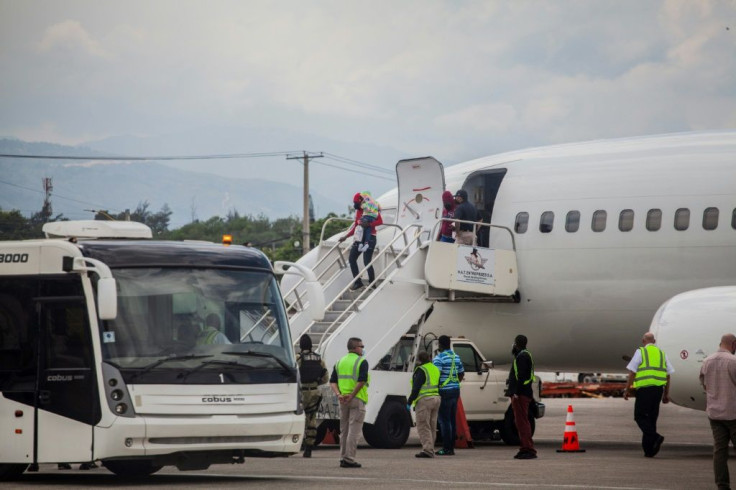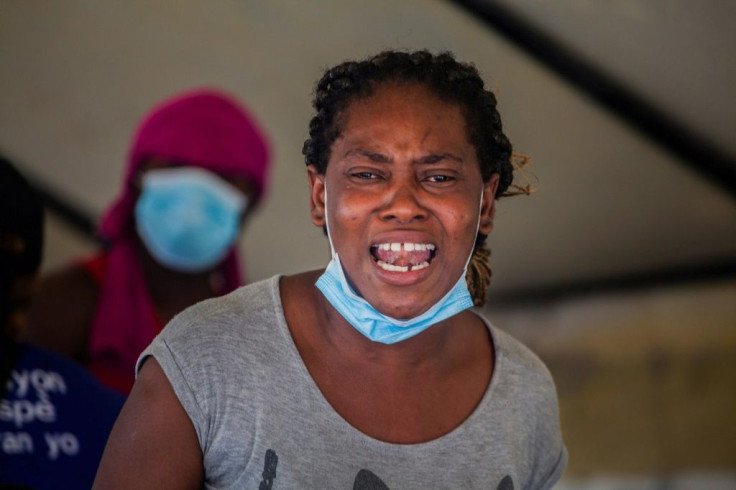Expelled From US, Haitian Migrants Return To A Country Wracked With Poverty, Crime
First, they fled to Latin America in hopes of a better life. When that failed, they set off for the United States. Now, expelled by the hundreds from American soil, young Haitians are forced to return to their impoverished homeland that has no means of welcoming them.
Deported to Haiti with his wife and two-year-old son, Belton has no idea how he will feed his family there. The young man, who asked his real name be withheld out of fear for his safety, is deeply scarred by his three-month-long journey across the American continent.
"We crossed nine countries. We saw a lot of dead people, bodies. We slept in the jungle. And now it's over," Belton said.
Many of the migrants left Haiti years ago. Some of them traveled to Brazil, which was looking for cheap labor at the World Cup in 2014. From there, they headed to Chile, which was experiencing an economic upturn. But in 2018, Chile shut its doors to migrants, and the Haitians set off for the United States.

"They sold everything they had in Chile and spent thousands of US dollars to cross Latin America. And they are now returning to Haiti with only the clothes on their backs," said Haitian economist Etzer Emile.
As thousands of mostly Haitian migrants crammed under a bridge in the town of Del Rio on the US-Mexico border, the Biden administration sped up deportation proceedings, sending the migrants home without giving them a chance to apply for asylum.
"We know we were a problem because it was really starting to get crowded under the bridge. But to send us back here, to do what?" asked Raphael, 32, who was deported to the Haitian capital Port-au-Prince on Sunday.

"When I was in Chile, I was able to send some money for my family," he added.
The migrant diaspora in Latin America had become a lifeline for their loved ones back in Haiti. Last year, private remittances from Chile totaled $134 million.
"There is no work here, there is nothing for us to do," said Raphael.
For now, each person deported from Texas received a payment of 10,000 gourdes ($100) from the US government, half of which was paid via a mobile app to prevent the arrivals from being targeted by thieves in Haiti.

Amoce Auguste, lawyer and deputy director of the Office of Citizen Protection, says the government does not help the repatriates, leaving people who haven't lived there for many years on their own.
"Once people leave the airport with a small lump sum, it's over," Auguste said.
They also must reintegrate into Haitian society, no small feat for people who have been gone for "five, seven or 10 years," he added.
Having once left their country because they couldn't find work, they must now return to a place where the economy is in free fall.
"What we are experiencing is an unprecedented situation: we will see negative economic growth for a third consecutive year," said Emile, the economist.
And if economic hardship were not enough, Haiti is also plagued by gang violence.
"They come at a time when all Haitians would like to flee the insecurity of gangs," said Auguste.
Over the past year, the armed gangs that ruled the shantytowns in the capital have extended their hold across the country.
And the country continues to be mired in deep political turmoil after the assassination of President Jovenel Moise by a hit squad in July.
Dozens of people have been arrested, but the identity of those who orchestrated the crime remains a mystery. Prime Minister Ariel Henry has dismissed suspicions raised against him, and he fired the prosecutor who wanted to charge him in the crime.
Haiti has neither the experience nor the logistics to manage so many incoming migrants, Emile warned.
"But the worst thing is that this is not the authorities' priority," he said.
© Copyright AFP {{Year}}. All rights reserved.





















